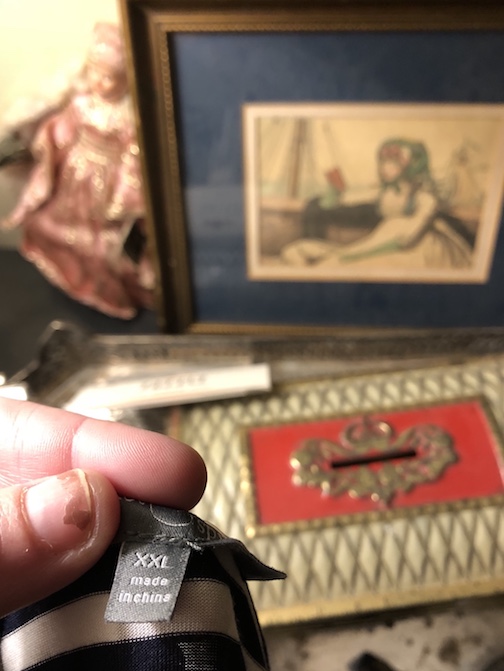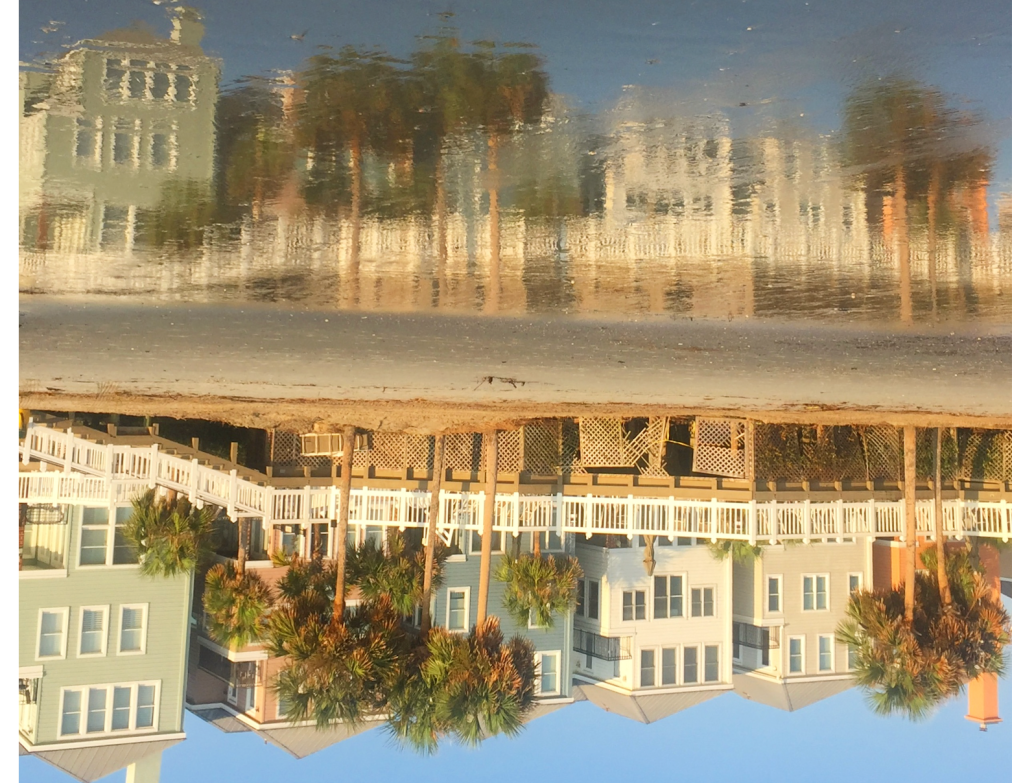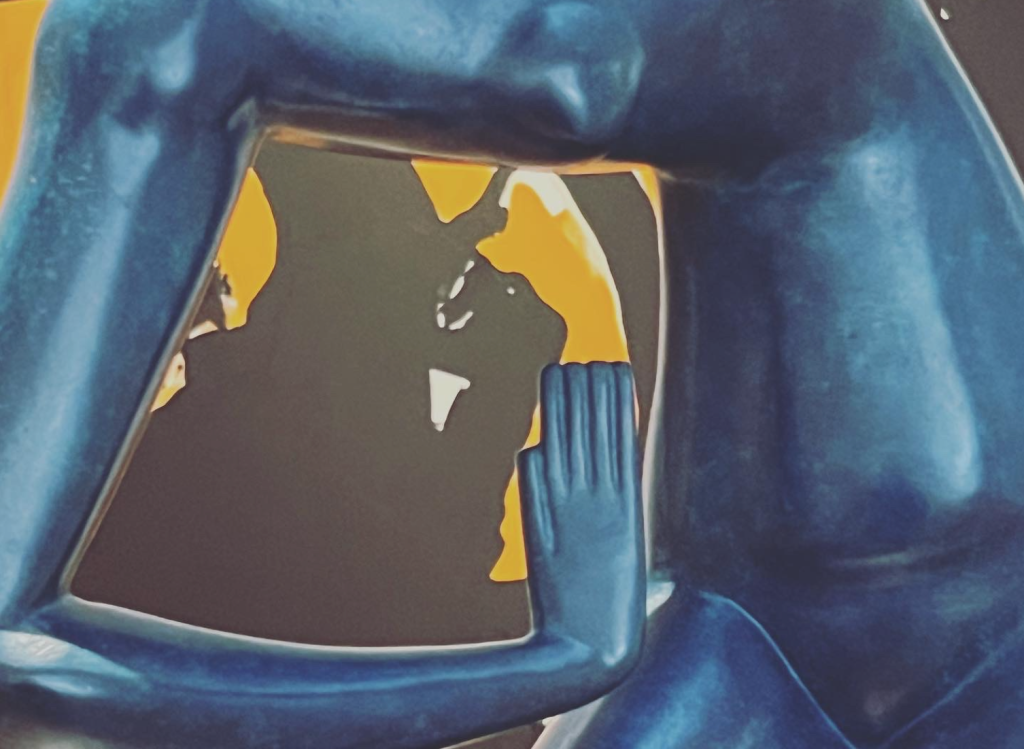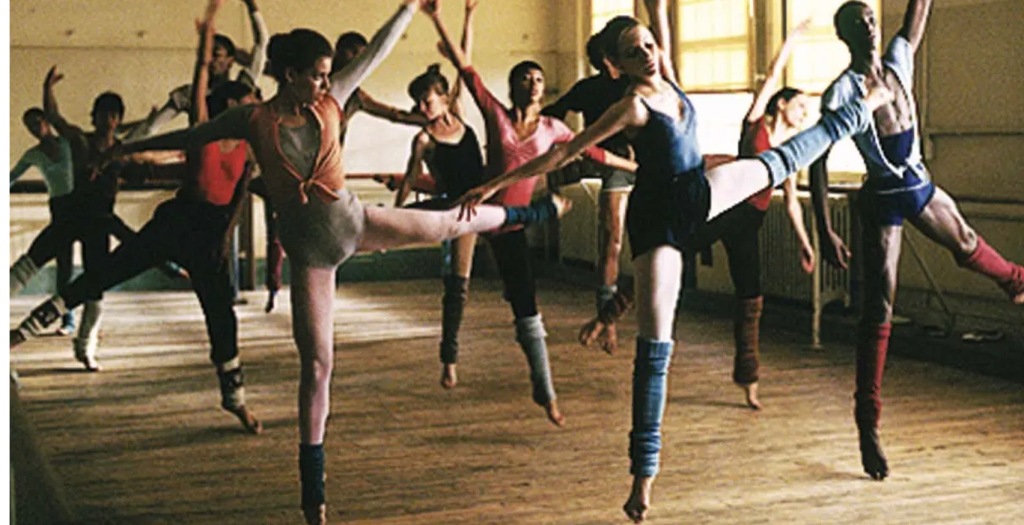i.
When I was five years old, my mother and my grandmother used to ply me with treats because I was all eyes and skinny legs, chronically underweight. They supposed I drank too much (juice and water, charges of hitting the gin too hard were a few decades yet to come). They supposed I ate too little. They doctor supposed I would stay small into adulthood, despite coming from (mostly) tall people. I doubt she’ll hit 5’4. My little sister (who came roaring out into the world like a queen and was thus (partly) named after The Queen) was projected to be a giant. The pediatrician poked at her chubby knees and said, She could be six feet tall. Six feet wasn’t all that rare for women in my family. My mother (herself barely an inch shy of) just nodded and said something to me about the charms of being petite, a fairy princess.
I had the youthful confidence of being a pretty child. People told me so all the time. My mother was an artist. She painted portraits of other people, other children. She used to study my face and tell me it was uncannily symmetrical, very beautiful. I would stare at myself in the mirror and summon an imaginary friend from my reflection. I called her Zaka. She was pretty, even if her hair didn’t curl the way I wanted and truly, if it were as short as my mother regularly threatened to cut it, she might look exactly like a boy. Zaka would clearly, obviously, stay pretty, in much the same way she was, because pretty was most important. I felt relieved to have her. I knew, no matter what, that she would stay loyal and constant, that she would never betray me, that she would always have my best interests at heart.
I still have a symmetrical-ish face, I suppose, marred as it may be by moles and wrinkles and the ever-lengthening list of age-related imperfections. I lost half an eyebrow about six years ago, thanks to an over-enthusiastic waxing job at a cheapo mini-mall nail salon. I still have one pointy ear and the same inconstant shade of green eyes I’ve long suspected to be my most reliably good feature. I can still the barest traces of Zaka if I squint through time and disappointment and, mostly, fat. But what I mostly see is Fat. Because I am Fat and Fat is me and it was always thus since Zaka slipped away without rhyme or reason one day around fourth grade and never returned. I never even got to say goodbye. I never got to ask why. I just turned on the light one day, one morning before school and instead of Zaka’s knowing, confident grace, I saw Fat. Slunking, slumping, skulking, sloppy Fat, who eschewed eye contact and changed her clothes in the dark. I despised her. I felt sorry for her. I hated everything she was. I wished she would go away and find some other poor soul to attach herself to, because couldn’t she see that I was better than that. That I wasn’t like her. That I was pretty, uncannily symmetrical, very beautiful. And she would only ever drag me down. The more I ignored her, the harder she chased after me. She seemed quite gratified by my scorn, like, she was some kind of masochist. And after all was said and done, she hung around. She hung around longer than anyone else. Absolutely loyal. Firmly steadfast. After thirty-odd years, it would seem I couldn’t lose her if I tried.
ii.
The thing about Fat is she’s easy to blame. And depending on my mood, I blame a lot—A Lot—on Fat. My lack of confidence, my solitude, my professional failures, my personal failures, my personality failures, my failure failures. She takes it because she’s round and cushiony and hard to break. She lands soft and giggles out some self-deprecating commentary and waddles along her way, inured to the stares and the that’s what happens when you don’t take care of yourself.
Is it possible there are other reasons why I am not an endlessly beloved, swaggering bastion of poise and perfect achievement? I am—this junk drawer of words perhaps notwithstanding—a rational, reasonable human being. Plenty of people who have been side-eyed out of a boutique that doesn’t carry their size or reminded they are technically obese by a medical professional have found fulfillment and fame and happiness and copious amounts of passionate lovemaking with a partner that simply adores them despite their stretchmarks. Am I also socially awkward and kind of elitist and inclined toward existential despair? Do I procrastinate? Do I talk to much? Yes. Am I lazy? Do I lack will-power? Is Fat the manifestation of all the ways in which I am flawed or are my flaws the reason for Fat? How much of my life is determined by the expanse of hips—comically oversized like the boned and fluffed architecture under a Rococo court dress? How much am I letting this or that chin (or all in concert) steer my course through life?
Fat has a weakness for conspiracy theory. She feels bad for buying into it (because she feels bad about everything) but she still keeps me up with second guesses. Here’s one: do I have friends in spite of Fat or because of her? In high school, in college, I’d find myself surrounded by whisper thin, pretty girls and think I might shine in a bit in their collective shimmer. But Fat would whisper, you make them look good—even better, even thinner–by contrast. They like you because you’re not a threat. Because compared to you, they always win. She wasn’t alone. My grandmother once told me, point blank, that I’d be far better off making friends with bigger girls, so when we were all out together I wouldn’t look so . . . so . . . disproportionate.
Nana wasn’t wrong. Fat did look disproportionate. When I saw her in pictures with my friends, she appeared to be a different scale of thing, maybe a different species altogether. Every piece of me was bigger—from features to fingers to feet. I growth-spurted into tall-ish late, sometimes during sophomore year of high school, as if to underline just how wrong my childhood pediatrician had been. But Fat didn’t stretch out into lean angles and elbows, just reconfigured, and settled into new, uncomfortable curves that didn’t make me look like a glamorous woman so much as a prematurely middle-aged frump.
iii.
You’re asking yourself, Has she lost her mind? (Maybe) You’re wondering, Why doesn’t she just do something about it? Like eat less and exercise. (I’ve tried and failed and failed again and failed better and failed so well that I’m in pretty good shape, no matter what Fat would have you believe). You might even be thinking, You’re not Fat. And hey, there’s always someone around telling Fat she isn’t. That person is usually not fat. That person is usually normal-sized, often the variety of normal size that spends two weeks in the gym trying to work off a burrito lunch because they live in fear that three extra pounds is a slippery slope. Other fat people generally refrain from such commentary because they know the fuck better. Specifically, they know that while fat is the kind of elastic-waisted, billowy pejorative that can be applied to just about any person with an extra ounce of body fat, Fat has its own zip code and it’s never going to be the right side of town. And though Fat comprises considerable diversity in size and shape, she tends to recognize herself even as she obsessively compares. Am I the fattest person in the room? Is she as fat as I am? Is she fatter? It’s terrible, embarrassing, wrong that she does it, but I doubt she’s alone. And at least it’s not as bad as the moments when Fat is the only fat person in the room, or in on the block, or like, in the actual zipcode.
I know, by the way. The grass is always greener. Thin people are nodding. And let me crystal clear about this: I don’t think I know a woman, no matter her size or shape, without a body image issue. It’s the only metoo bigger than #metoo. You came blame fashion designers and fast food and the diet-industrial complex and the patriarchy (it’s probably the patriarchy).[1]
Pretty, thin girls worry they’re valued only for their looks. Fat worries she’s judged for her lack thereof. It’s not enough to be simply unattractive. Beauty has a moral component. Fat is unhealthy, irresponsible, lazy, self-indulgent, hedonistic, needy, a visible sinner, deceitful, leeching off society. Most other transgressive self-destructive behaviors can look a little romantic in the right light. Consider the sordid glamor of movies about, say, heroin addicts. But gluttony is the least sexy of the Seven Deadly. No one writes great swaggering rock songs about going on a pasta bender. There’s no famously edgy poetry about being too fat for an armchair. I’ve yet to see a fashion magazine advertise a new look as being “carb chic.”
Fat assumes people won’t smile back. Fat is surprised when people don’t recoil. You figure out what makes you interesting. You work on your shtick. You do funny—people tolerate Fat when she’s funny. You do easy to please. You don’t freak out. You don’t get too serious—people can’t take Fat seriously. I mean, please. You try not to judge people the way you think you’re being judged. You know first-hand, that people are so, so much more than how they look. You find that you know little things, like, how it’s always safer to compliment a pair of earrings of a shirt or a haircut or a tattoo than it is to tell someone they look thin or they have beautiful skin, because that tattoo is a choice about how a person wants you to see them as opposed to whatever perfect storm of genetics and lifestyle and health and a whole College of Social Sciences worth of circumstances well out of their control gave them the underlying hardware.
Some of my friends are freaking out about their age these days. They’re worried about incipient middle age making them invisible and undesirable. Fat finds this hilarious. She doesn’t know what it is to be visible, to be desirable, to walk into a room and have people gaze in admiration. She wants to tell them, you know there’s more to you, right? She wants to say, it’s not so bad, really, when you can’t fall back on looks. You get used to it. After all, you can be left alone. After all, it could be worse.
I get the fear, though. We’re taught not to judge books by covers from earliest fairy tales on. We strive not to. But we still live in a world defined by racism and sexism. We still fear things that are different from us. We find them unsettling, useless, disgusting. And we still have to live in that world. Society requires we interact with those things, even when we don’t believe those things, even when they say we are those things.
You may be angry at the fact that I’m not preaching radical self-acceptance and reclaiming Fat as something strong and powerful and beautiful. Something to be loved, not hated. I wish I could do that. I’ve been trying to learn how. It’s maybe harder than anything else that I’ve ever tried to do, including, say, eating less and exercise. As noted above, Fat makes a great scapegoat. She literally eats the job right up, sometimes with an extra serving of whatever current dietary wisdom says is bad for us. By blaming Fat, I can avoid having to burrow in too deep with the other deficiencies. They’re all there. A real rogues’ gallery, another story down, drinking whisky and playing a hand or two with my future and my financials, waiting for their 4am curtain call on a sleepless night, after Fat has finally punched out and gone for some shut-eye.
iv.
It may surprise you to know that I forget about Fat. I can go hours, even days, without giving her so much as a thought. I spend a lot of my life inside my own head, unreflected by mirrors or unflattering Facebook photos, and in there I’m anything. A shapeshifter, a chimaera, an endlessly glorious, slightly androgynous being suffused with the power of infinite transformation. Or at the very least: a dead ringer for Cate Blanchett.
I can strip myself bare (not always literally) and interact with the world on a purely sensual level. All body and no body at once. I am the first spring sun glancing across my face when I wander up the street for coffee. I am the smell of rain and salt from the bow of a boat on one of those summer afternoons that make you feel like you could fly over the tempest and across the bay. I am the sound of the wind rattling the oak limbs and the autumn roses and the breeze curling its fingers round to brush the short hairs on the nape of my neck. Or Orion over the backyard on a cold, clear, winter night winking at me like I’m the only girl left in the room. I am wine that tastes like a dry sunset over a lazy sea. Cheese that tastes like a nap at Versailles. Berries that taste like skinny dipping in the dead of summer with the friends your mother didn’t entirely approve of. Shellfish like briny abandon. Warm, crusty bread, fresh from the bakery, that tastes like a kitchen full of wisdom. I could go on with the food. Obviously, you think. And at risk of sounding cliché, I don’t thing Fat has hung around this long because I ‘m a bad cook. She feels guilt–so much guilt–about it. But we really are both hedonists.
In those moments when I forget what I am and become only what I feel, I have a sense of anything being possible. I am free from the girl in the mirror. Any of the girls in the mirror. I can just be purely myself. Honestly, I don’t even know what that looks like. Only that it doesn’t matter because it feels right. To me. To anybody else. But mostly to me.
v.
Sometimes I wish I could see Zaka again. I have words for her. Not all pleasant. Also, I would like to introduce you to her. I want you to know that I was not always this. And I know you can’t see her, but she still lurks in the peripheral, in the flattering selfie, a silhouette of missed opportunity, a flittering shadow of what may have been, now reduced to a footnote to what is certainly a hefty (natch), annotated biography of Fat—my partner, my nemesis, myself.
As a child, I read myth the way other kids read fairy tales and Bible stories. I was fascinated by transformation, even when it became grotesque. I thought it possible I might become a tree, a spider, a swan or a God. For a time, I believed perhaps my own unwelcome transformation was a result of this, that the universe had misread my interest as latent desire and fashioned for me a monster suit that I could not remove so I could better understand how those stories ended. How did Niobe fare once she became a waterfall?
I’m just American enough to still believe in spontaneous, fantastic transformation, but in a measured, sidelong kind of way. Knowing what I am and being okay with it is more rational, more preferable to endless expectation of Salvation via Powerball, the eclipsing success gleaned off a single TED talk, a Rom Com of a love affair, the dreamy reflection of myself as Beauty, Realized.
I suspect the solution to Fat is to no try and force her away or into something she cannot be, but to try and make her more comfortable. I can maybe stop trying to stuff her into pants that don’t fit and let her exist in a corner of the world where she’s not just a thing to be pitied and jeered at and loathed in my bathroom mirror but something that could be, just maybe, if not beautiful, never beautiful, at least worthy of my eye-contact, of basic respect, of the simple, affectionate regard of a sustained second glance.
[1] To be clear: there are plenty of men and non-binary people with body image issues and eating disorders too. That’s also probably because of the patriarchy.




